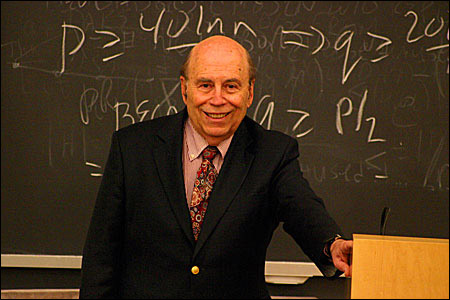Rabin awarded 2004 EMET Prize

The A.M.N. Foundation for the Advancement of Science, Art and Culture in Israel has recently awarded Michael O. Rabin, Thomas J. Watson Sr. Professor of Computer Science, the 2004 EMET Prize in the exact sciences (computer sciences).
The citation reads in part: “The EMET Prize is awarded to Professor Michael Oser Rabin for his extraordinary achievements in a variety of fields: Automata theory, computational complexity, randomized algorithms, and encryption theory…. His influence and international status have greatly contributed to advancing Israel’s standing as a leading world center of computer science and knowledge-intensive industries.”
Rabin, who has taught jointly at Harvard and Hebrew University for many years, received his M.S. in mathematics from Hebrew University, and his Ph.D. in mathematics from Princeton University. He is well known for co-developing the Miller-Rabin randomized primality test, an algorithm that determines whether a given number is prime. Because the generation of large primes is essential to all modern cryptographic systems, the test is used millions of times each day to protect and secure transactions on the Internet.
In recent years, Rabin has created, with Yonatan Aumann and Yan Zong Ding, Hyper-Encryption, the first-ever encryption scheme provably providing everlasting secrecy against an adversary with unlimited computational power.
Currently, Rabin and his students have practically implemented Hyper-Encryption by using a “virtual satellite” model, a common peer-to-peer network where each node stores and updates random pages that are downloaded on request by parties using a common key.
Rabin’s contributions have been recognized with numerous awards, including the Paris Kanellakis Prize in 2004 (with Gary Miller, Robert Solovay, and Volker Strassen) and the A.M. Turing Award, considered the highest honor in computer science. Rabin is a member of several academies, including the U.S. National Academy of Sciences, the French Academy of Sciences, the American Academy of Arts and Sciences, the American Philosophical Society, and the Israel Academy of Sciences and Humanities.




